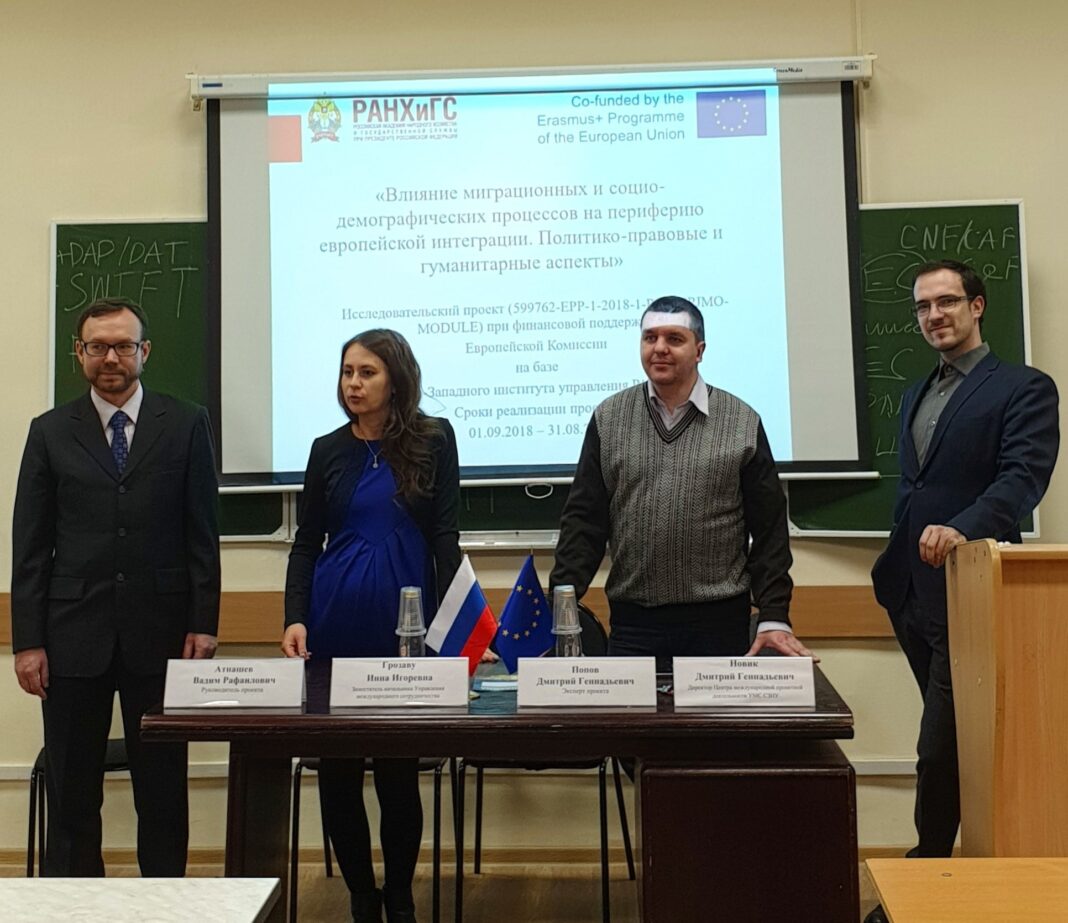The module “The influence of migration and socio-demographic processes on the periphery of the European integration. Legal, political and humanitarian aspects” was fulfilled in 2018-2021 at the North-West Institute of Management [NWIM], RANEPA branch in St. Petersburg (Russia).
The educational activity of the Module was divided into 4 main topics and lasted 74 hours per year. Its 4 parts illustrate the multidisciplinary specifics of the project.
1. “Megatrends and actual problems of socio-demographic processes in the modern world“. This made it possible to focus on the experience of European futurologists and experts in the field of labour and human capital, familiarized students with demographic and social problems based on a modern world map. The main influence was the formation of basic knowledge and skills of analyzing Europe as a centre of migration attraction.
2. “The European macroregion in the space of migration mobility” was devoted to the formation of knowledge about the EU, taking into account migration and demographic factors. Students gained knowledge about the features of the European “migration crisis”, practices related to its resolution, and various trends in its development.
3. “Legal aspects of migration processes in Europe”. Specific knowledge and skills in the field of international and European law and their impact on national legislation in the field of migration policy were formed here. Various cases from the practice of the European Court of Human Rights were presented and analysed at the seminars.
4. “The social and humanitarian aspect of migration. National and European context”. It introduced students to contemporary European art on the topic of the project and strengthened their common European identity. The case study included in this part of the course was based on the activities of international organizations, both governmental and non-governmental.
All topics included the main types of educational activities such as lectures, seminars, research training of students, round tables, writing essays and articles.
Students of several universities (majors in law, international relations and politics) participated in the module, including foreign graduates of NWIM from Greece and Latvia. The project was carried out by 3 professors: Dr. Vadim Atnashev (Department of International and Humanitarian Law, Head of the Module), Dr. Dmitry Popov and Dr. Dmitry Novik (both from the Department of International Relations).
Besides classes, special events were also organized. Students visited the Russian Ethnographic Museum, and the visit was accompanied by a special lecture on the origin of European ethnic groups, read by a representative of the museum. At the end of each academic year, the final projects were defended at the spring conference.
The first year conference was organized jointly with the St. Petersburg House of Nationalities (in May 2018), at the second year it was held online, and the Concluding conference was held in the NWIM RANEPA in a mixed format (in May 2021). The events were attended by representatives of various organizations and communities.
The COVID-19 pandemic has very significant effects on the education system in general, and the Module was not an exception. The online environments required to record classes and make them available for asynchronous study. Another benefit was the greater possibility to invite foreign experts to take part in Module events (experts of University Carlos III of Madrid, Utrecht University, and others).
The main dissemination tool was the Modular Course itself and the interdisciplinary educational space within it. The educational program connected the student with theory and practice, as well as with public discourse on migration policy, decision-making practices and the humanitarian side of migration in the EU and beyond.
The Module had a positive impact on the students’ sense of justice, political pluralism and tolerance based on student’s polls. The students of the Module who studied (or still continue to study) at the Law faculty, have demonstrated at seminars a better grounding in international law, especially international human rights law, compared with other students.
Studying social and humanitarian aspects of migration allowed students to get acquainted with independent humanities, which, as a rule, are free from politics and focused on human values by nature. Fine art grew interest and discussions on such topical issues as the human rights of immigrants, refugees and their integration in Europe. This has undoubtedly increased the students’ empathy and ethical effectiveness. The gender aspect was also touched upon, which is especially important for the Russian student audience, which is dominated by women.
The project team encouraged active participation, independent thinking and pluralism of opinions among students. The students’ graduation papers were written on topical issues of European and world migration and contain a deep and interesting analysis of migration processes, the relevant humanitarian and legal situation, including human rights issues.
Dr. Vadim Atnashev has noticed a higher level of tolerance and perception of European values among the graduates from the Module. The collected papers of the module include the article “Immigration into the European Union by Religious Refugees: a Situation to Improve” by Ivan Arjona and Dr. Christian Mirre from the Foundation for Improvement of Life, Culture and Society.









